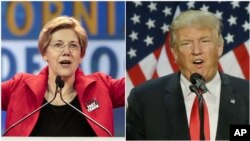He called her "goofy" Elizabeth Warren.
The Massachusetts senator in turn called the presumptive Republican nominee Donald Trump "dangerous."
And then Trump whipped out the "woman card' — a charge he has already fired at Democrat presidential contender Hillary Clinton:
Warren fired right back:
Trump firing insults on Twitter is nothing new. But this brawl seemed different.
“A number of people have tried to give it back to him and they’ve been really unsuccessful,” Jacob Weissberg, a writer at Slate and host of the popular podcast Trumpcast. “The thing that is remarkable about Elizabeth Warren is that she gives as good as she gets … she has been really effective in responding to him on Twitter.”
So if Trump is a “bully,” as many of his critics maintain, Weissberg thinks Warren’s magic lies in being a kind of “counter-bully.” And she also has a way of, as Weissberg puts it, “very subtly” mocking Trump's often brutish language.
Another political expert, Stuart Rothenberg, founding editor and publisher of The Rothenberg & Gonzales Political Report weighed in on the Warren-Trump digital wrestling match.
"I don't really pay attention to Twitter fights. So, I have nothing to say."
Political analysts are not the only ones who ignore the back and forth on Twitter. It's fair to say relatively few Americans closely follow the exchanges.
But these mini-arguments, sent in bursts of 140 characters, end up driving the 24-hour political news cycle, turning tweets into front-page stories, driving political talk shows and rewarding those candidates who continue to create viral hits.





